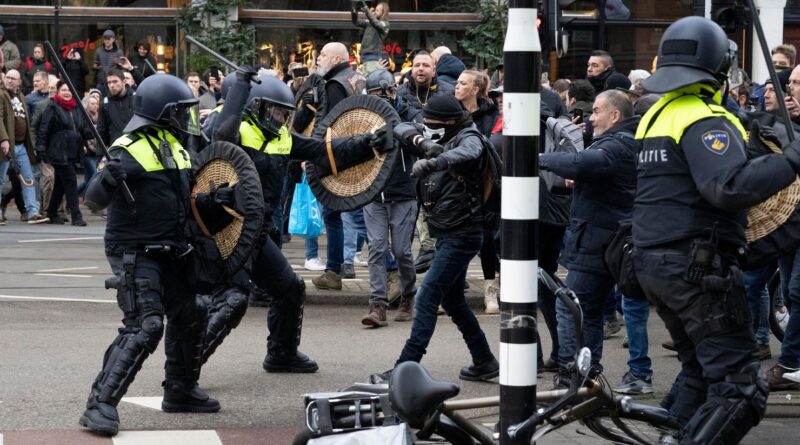Anti-Immigration Protest Turns Violent in The Hague
In the Netherlands’ capital city, The Hague, the local police force had to engage in riot control against boisterous anti-immigration demonstrators. The authorities arrested thirty individuals involved in hostile acts such as throwing crude weapons like rocks and bottles. Taking place on a Saturday, the protest also witnessed significant exchanges between the cops and the crowd, that led to injuries for a couple of police officers.
A massive number of about 1,500 participants in the protest clogged a prominent highway which runs through The Hague, leading to a chaos on the streets. The situation further intensified as a police vehicle was set ablaze. These details emerged from the reports by ANP, a reputable Dutch news agency, that obtained its information directly from police records.
The country’s Prime Minister, Dick Schoof, voiced his disapproval of the violence seen at the protest. He termed the visuals coming out of the scene as ‘shocking’ and ‘bizarre’, standing out for their unabashed aggression. According to him, such occurrences were ‘completely unacceptable’ and stood against the norms of a civil democratic society.
Interestingly, the leader of the right-wing faction and previous election victor in the Netherlands, Geert Wilders, decided not to take part in the assembly despite being invited to deliver a speech. Wilders, who still enjoys the top spot in public opinion polls scheduled before the 29th of October vote, opted to condemn the disorderly conduct shown against the police. He labelled it as ‘utterly unacceptable’ and attributed its cause to ‘idiots’.
This demonstration calling for more stringent immigration control and tougher stance on asylum seekers was not a spontaneous outburst, but an organized event from right-wing activists. The violent confrontations sparked off when the protesters waving Dutch flags in solidarity approached the deployed security forces en masse.
A major point of contention arose when the demonstrators vandalized the office building of the D66 party, a centre-left faction. D66 is perceived by the far-right leaning crowd as catering to the progressivist elites, thus becoming a target during the protest. The vandals shattered the glass windows on the structure, causing extensive physical damage.
Rob Jetten, the head of the D66 party, expressed his discontent against the actions of the protesters. He lamented about the extensive destruction caused inside their office and strongly told the protesters to ‘stay away from political parties’. Jetten refuted the attackers’ attempt to intimidate his party through such violent means.
In a defiant statement, Jetten seemed undeterred by this act, saying ‘If you think you can intimidate us, tough luck’. His tenacity shone through as he further pledged that, ‘We will never let extremist rioters take away our beautiful country’. Reports from ANP confirmed that luckily nobody was inside the D66 party office during the time of this violent disturbance.
The Netherlands’ administration faced a major setback in June when it went through a governmental breakdown. The backbone for this political upheaval went back to disagreements on the issue of immigration as Geert Wilders decided to cut off support from his right-wing PVV party, resulting in the coalition government’s collapse.
For context, the PVV’s withdrawal from the ruling alliance came as a fallout from arguments over policies related to migrants. Wilders had reportedly demanded stricter asylum regulations, which encompassed ten new measures. His demands ranged from pausing all applications for asylum, cessation of construction work on new reception centres, to curbing family reunification.
The governing alliance had a rather short run, being operational for less than a year. The fallout over migration policies led to the abrupt end of the coalition. It clarifies the further significance behind the recent protests as the nation grapples with a tumultuous political landscape amidst heightened tension surrounding immigration policies.

